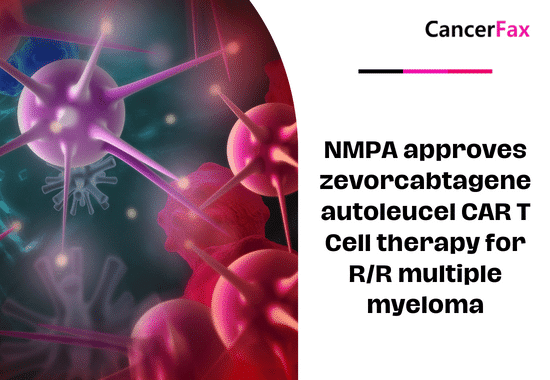Zevor-Cel therapy
Chinese regulators have approved zevorcabtagene autoleucel (zevor-cel; CT053), an autologous CAR T-cell therapy, for the treatment of adult patients with multiple myeloma that has relapsed or is no longer responding to at least three lines of treatment, such as a proteasome inhibitor (PI) and an immunomodulatory drug (IMiD).
The regulatory decision was supported by data from the phase 1/2 LUMMICAR STUDY 1 trial (NCT03975907), which showed that at a median follow-up of 37.7 months (range, 14.8-44.2), evaluable patients treated with the BCMA-targeted CAR T-cell therapy (n = 14) achieved an overall response rate (ORR) of 100% and a complete response (CR)/stringent CR (sCR) rate of 78.6%.2 Notably, all patients with a CR/sCR had minimal residual disease.
“In the realm of traditional treatments, the prognosis for patients with relapsed or refractory multiple myeloma remains notably grim, given the lack of available therapeutic alternatives,” said Wenming Chen, MD, PhD, who led LUMMICAR STUDY 1 and is the director of the Hematology Department at China’s Beijing Chao-Yang Hospital of Capital Medical University. “These people have significant unmet clinical requirements, demanding the rapid adoption of effective, safe, and convenient therapeutic options. The approval of zevor-cel not only broadens the range of options available to clinical practitioners, but also gives patients new hope.
LUMMICAR STUDY 1 was an open-label, multicenter experiment that tested zevor-cel in patients aged 18 to 75 with relapsed/refractory multiple myeloma.3 A minimum of three prior lines of treatment were necessary, including one PI and one IMiD. illness relapse within 12 months of the last line of therapy, or illness progression within 60 days, was necessary. Other important inclusion criteria included having a life expectancy of at least 12 weeks, an ECOG performance level of 0 or 1, and acceptable organ function.
The trial excluded patients who had previously received CAR T-cell treatment, BCMA-directed therapy, or an allogeneic stem cell transplant for multiple myeloma. Autologous stem cell transplants less than 12 weeks before leukapheresis were not authorized.
Patients were given a single zevor-cel injection one to two days after lymphodepletion was completed. At the most current data cutoff date of July 17, 2023, three of the 14 evaluable patients got CAR T-cell treatment at 1.0 x 108 CAR+ T cells, while 11 received an infusion of 1.5 x 108 CAR+ T cells.
Phase 1’s primary endpoint was dose-limiting toxicities, while phase 2’s was ORR. Secondary outcome measures included MRD negative, time to response, CR/sCR rate, ORR at week 12, clinical benefit rate, safety, and pharmacokinetics.
Patients evaluated for efficacy had a median age of 54 years (range, 34-62), with half having high-risk cytogenetic abnormalities. Notably, 14.3% had extramedullary illness, while 14.3% had stage III disease, according to the International Staging System.
Concerning safety, no cases of grade 3 or higher cytokine release syndrome or immune effector cell-associated neurotoxicity were reported. Three patients had treatment-related grade 3 infections. Three patients reported major adverse effects (AEs), with two of them suffering from lung infection and tumor lysis syndrome. Two deaths were reported, although neither was attributed to zevor-cel.
According to a news release, Chengcheng Fu, MD, PhD, who was the principal investigator of LUMMICAR STUDY 1 and the director of the Hematology Department at the First Affiliated Hospital of Soochow University, said that zevor-cel had shown “deep and lasting therapeutic efficacy” in patients with relapsed or refractory multiple myeloma, along with “generally favorable tolerability.” 1 “We are delighted to see the regulatory approval and market debut of zevor-cel. We are excited about its potential to benefit a larger number of people and help them achieve high-quality, long-term survival.”
Zever-cel is also being tested in the phase 2 LUMMICAR-2 trial (NCT03915184) in North America. Data from 11 patients who were able to be evaluated showed an ORR of 100%, with all of them achieving a very good partial response or better. One of the best biotech companies in China, is currently supplying this therapy to hospitals in China.


